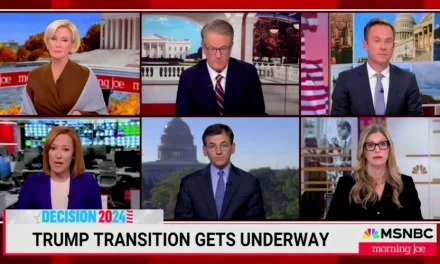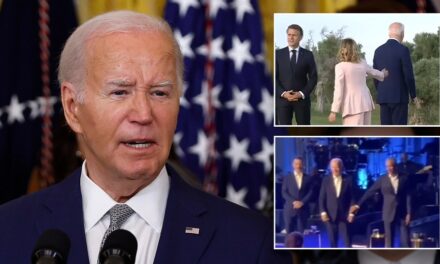In a recent appearance on CBS’s “60 Minutes,” Ukrainian President Volodymyr Zelenskyy made headlines with bold comments about the ongoing military aid the United States is providing to Ukraine in its war against Russian aggression. The segment, which aired on a Sunday evening, was both anticipated and scrutinized, providing insights into the ongoing conflict and how international aid is being perceived by leaders involved in the situation.
However, Ohio Senator JD Vance was quick to respond to Zelenskyy’s statements, labeling them as “absurd” and “not productive” in a series of remarks made after the broadcast. Critics have been assessing the interaction and the implications of such high-stakes commentary on American politics and public sentiment toward the protracted conflict in Eastern Europe.
Vance, a Republican senator who took office in 2023, expressed his discontent in a statement posted on social media. He argued that Zelenskyy’s assertions regarding the necessity of continued U.S. financial and military assistance to Ukraine were unrealistic. The senator highlighted concerns about America’s looming domestic challenges and the ongoing discourse regarding fiscal responsibility. He stated, “We must focus on our issues here at home rather than sending countless funds to foreign nations.” This pointed critique reflects a growing sentiment among some lawmakers who believe the U.S. needs to prioritize domestic issues over foreign commitments at this time.
During the “60 Minutes” interview, Zelenskyy articulated his perspective on why sustaining military support from the U.S. is essential for Ukraine’s survival against Russia’s advancements. He pointed to the numerous sacrifices made by the Ukrainian people and the impact of continued aggression from the Kremlin as reasons for seeking unwavering support from allies, particularly those in the West. His passionate appeal hinged on the notion that Ukraine’s fight is not solely about itself, but about broader democratic values that are under threat globally.
In response, Vance characterized the Ukrainian president’s appeal as disconnected from the realities on the ground in the United States. “To imply that we are obligated to support every demand with funds and weaponry when we are facing our fiscal challenges is simply not a conversation that will resonate,” Vance commented. This perspective has resonated with certain segments of the American public who are increasingly vocal about their concerns regarding government spending and national debt.
The senator’s reaction is part of a larger trend of skepticism that has emerged among some lawmakers concerning the U.S.’s financial support for Ukraine. While there is bipartisan support for aiding Ukraine in its fight against Russian aggression, there is also a rising tide of caution regarding how much assistance should be extended and what form it should take. This evolving discussion has led to debates within Congress about establishing clearer guidelines and conditions for continued U.S. aid.
Moreover, some officials have begun to advocate for a reassessment of how aid is structured and delivered. The goal is to ensure that American taxpayer dollars are utilized in the most effective manner, emphasizing transparency and accountability. As lawmakers push for these changes, the importance of maintaining strategic alliances while fostering fiscal responsibility becomes a focal point in discussions on national defense and foreign policy.
In light of Zelenskyy’s comments, Vance called for an open dialogue concerning the implications of foreign aid. “We must come together to question not just the amount of aid, but the manner in which it is being allocated. Accountability should be at the forefront of any assistance we give,” he asserted in a follow-up statement. His comments suggest a desire to bridge the widening gap between American citizens’ perspectives on Ukraine, foreign aid, and the domestic issues they care deeply about, such as healthcare, education, and infrastructure.
The senator’s remarks opened up wider discussions about the balance the U.S. must strike between international relationships and domestic priorities. Some critics have accused him of prioritizing political populism over the complexities of international relations. In response, Vance maintains that addressing contemporary domestic concerns does not equate to abandoning allies, but rather to re-evaluating the strategies underlying U.S. foreign policy posturing.
As the situation in Ukraine continues to evolve, so does the discourse surrounding the international community’s response. Zelenskyy’s urgent appeals for aid are met with cautious scrutiny from lawmakers who are increasingly prioritizing the sentiments of their constituents. This complex interplay of international needs versus domestic realities is likely to create substantially divergent viewpoints as the political landscape shifts in the coming months.
The debate is not solely academic; it has tangible implications for U.S. policy. The calls for rationalizing aid to Ukraine mirror broader discussions about the role of the U.S. in global conflicts. Some argue that the expenses associated with foreign aid distract from investments in critical areas within the U.S. with the potential to yield significant long-term advantages. Balancing these dual priorities is likely to remain contentious among policymakers, with politicians from both parties seeking to assert their positions as advocates for either a robust internationalist approach or a more isolationist stance.
With the midterm elections approaching, these issues are poised to influence voter behavior and the direction of American foreign policy in managing relationships with NATO allies and global partners. As citizens digest the implications of ongoing foreign engagement and aid, the efficacy of these policies will come under increasing scrutiny.
As public opinion evolves in favor of transparency regarding government spending, Vance’s perspectives resonate with those constituents advocating for updated discussions on America’s stance in global conflicts. A debate continues to rage surrounding whether or not increased aid to Ukraine is in the national interest given current economic pressures, while simultaneously addressing the importance of standing with allies in the face of authoritarian aggression.
In conclusion, JD Vance’s critique of President Zelenskyy highlights significant divisions in U.S. foreign policy debates. The future trajectory of military and financial assistance to Ukraine will largely depend on how politicians navigate these challenging discussions between adhering to commitments to global allies and addressing the pressing needs of their constituents. As the war rages on, both sides of the debate will remain active participants in shaping American attitudes toward foreign assistance and intervention in global conflicts.
































